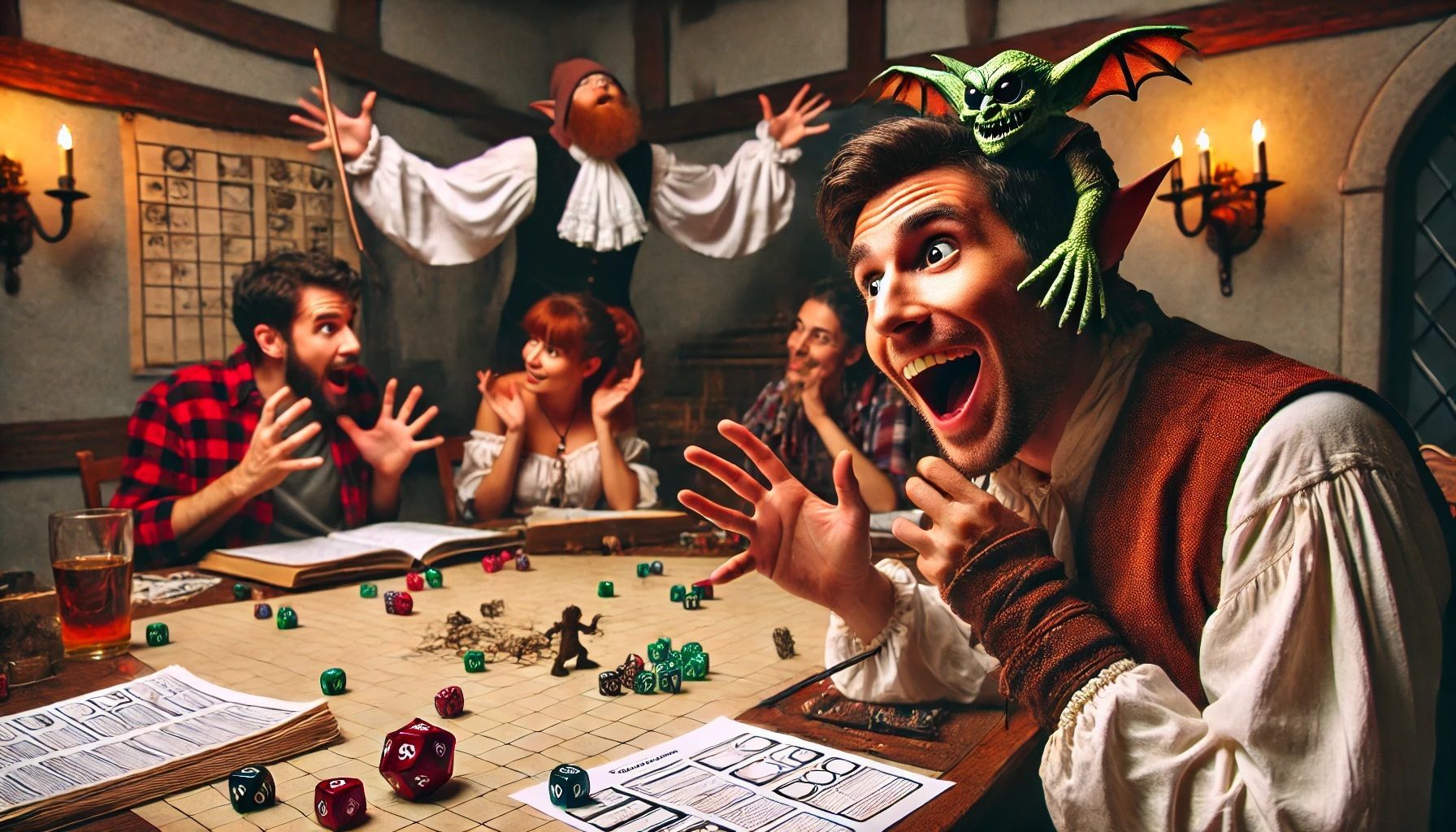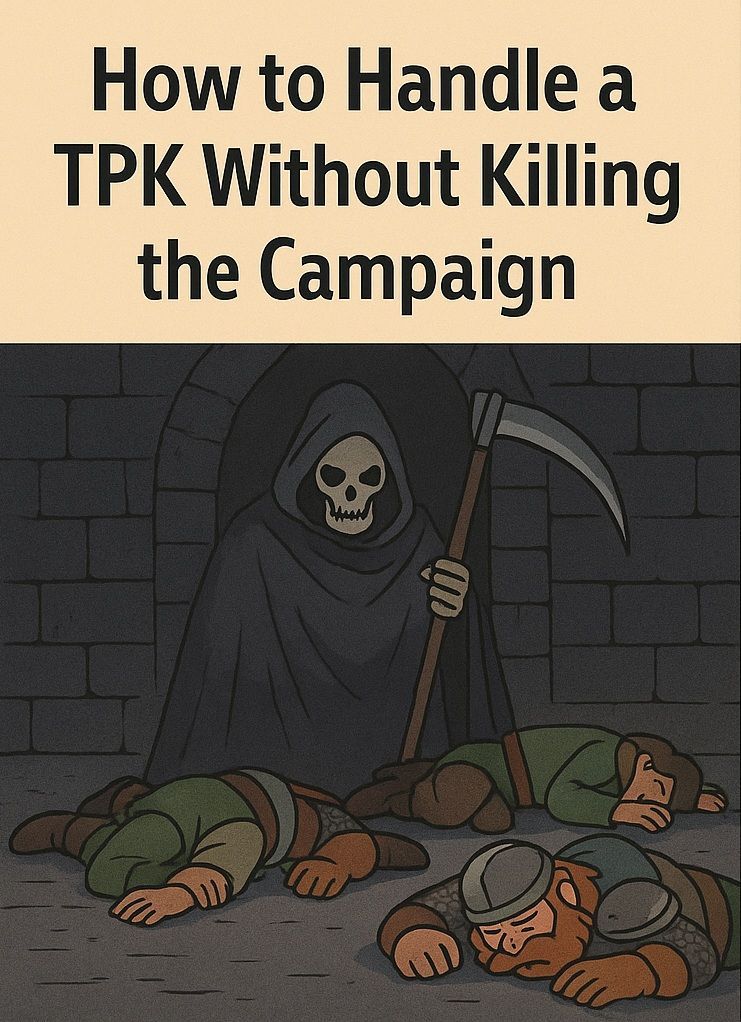Improvising in D&D: When the Campaign Goes Off the Rails and Dealing with "Chaos Gremlin" Players
..."and thomas hated the rails and decided to travel via roads, despite his being a train engine..."

Dear Readers,
If you’ve been a Dungeon Master/Game Master (DM/GM) for any length of time, you’ve probably experienced it: that moment when your carefully crafted campaign veers wildly off course, thanks to an unexpected player decision, a roll of the dice, or the whims of a “chaos gremlin” player. If you’re new to DMing, trust me—it will happen, and probably sooner than you think!
In an earlier post on February 14th, I delved into the art of running a D&D session with no preparation at all. If you haven’t read that one yet, I highly recommend checking it out as a primer on embracing the unpredictable nature of tabletop role-playing games. Today, however, we’re going deeper into the realm of improvisation itself—how to prepare to improvise, what to do when things go completely off the rails, and how to handle those players who seem to thrive on chaos.
Why Improvisation is Essential for DMs
No matter how much you plan, your players will inevitably surprise you. It’s part of what makes D&D so magical. Unlike a book or a movie, a D&D campaign is a living, breathing story created collaboratively by everyone at the table. The dice, the characters, and the decisions all contribute to a story that can twist and turn in ways you’d never expect.
Improvisation isn’t just a backup plan for when things go wrong—it’s a vital skill for keeping the story flowing and ensuring that every session feels dynamic and engaging. Great improvisation can make your world feel more alive and reactive, showing your players that their choices matter and that the world doesn’t wait for them to act.
Preparing to Improvise
This might sound counterintuitive—how do you prepare to improvise? It’s all about building a toolkit that you can draw from when needed. Here are some practical tips:
1. Know Your World
If you have a good understanding of your world’s lore, geography, and major factions, you can pull out details on the fly. When your players decide to visit a previously unplanned village, knowing the general culture and terrain of the region will help you fill in the blanks.
2. Create Flexible NPCs
Have a list of generic NPCs with names, personalities, and motivations that you can adapt to different situations. Your notes might just say “Gruff blacksmith, secretly loves poetry” or “Ambitious merchant, always looking for an angle.” When your players chat up a random tavern-goer, you can bring one of these NPCs to life.
3. Keep a Few Hooks in Your Pocket
Have a couple of simple plot hooks ready to deploy when needed. These don’t need to be fully fleshed-out quests—just enough to give the players something to bite into when they go off course. Think of things like “A child is missing” or “A storm uncovers a strange ruin.”
4. Embrace the Random
Use random tables to your advantage. Whether it’s a random encounter, a piece of loot, or a weather effect, rolling on a table can provide a spark of inspiration when your brain needs it most.
When the Campaign Goes Off the Rails
So, you’ve prepped a dungeon crawl, but your players decide to organize a political rally in the nearest city instead. Now what?
1. Say Yes, And…
One of the core principles of improvisational theater is to say “Yes, and…” This means accepting what your players want to do and building on it. Instead of trying to steer them back to the dungeon, figure out what this rally could mean for the story. Who might show up? What consequences might arise?
2. Don’t Panic
It’s easy to freeze up when things go off course. Take a breath. Buy yourself a moment to think by describing a detail of the environment or asking players what they’re doing. Sometimes, all you need is a few seconds to get your bearings. Douglas Adams got this one right:
“I like the cover," he said. "Don't Panic. It's the first helpful or intelligible thing anybody's said to me all day.”
- Douglas Adams, The Hitchhiker’s Guide to the Galaxy
3. Leverage What You Know
Pull in elements you’ve already established. If the players are heading to a random part of the city, use an NPC you created earlier or tie this new event into an existing plot thread. Reusing and recontextualizing elements can make your improvisation feel intentional and layered.
Dealing with Chaos Gremlin Players
Ah, the chaos gremlin—a player who thrives on doing the unexpected, often just to see what will happen. They might try to steal from the king during a formal banquet or set fire to the market square. While a little chaos can keep things fresh, too much can derail the game for everyone else.
1. Set Expectations Early
Before the campaign starts, have a session zero where you discuss the tone of the campaign and what kind of behavior is expected. Explain that while creativity and bold choices are encouraged, actions that disrupt the game or negatively impact other players’ enjoyment won’t fly.
2. Give Them Constructive Outlets
Chaos gremlins often act out because they want to influence the story. Try giving them a specific role where their unpredictability can shine. Maybe they play a character with a knack for improvising plans during heists or a bard who thrives on stirring up trouble—but in a way that moves the plot forward.
3. Reinforce Consequences
Actions have consequences in D&D. If the chaos gremlin sets the tavern on fire, maybe they get arrested, or a powerful NPC takes notice. Balancing fun with consequences can help guide chaotic behavior into more productive channels.
Conclusion
Improvisation in D&D is not about abandoning all plans—it’s about being flexible and finding creative ways to adapt when things change. Whether your players take the campaign in an unexpected direction or you’re dealing with the wild antics of a chaos gremlin, the key is to keep the story moving and maintain the fun at the table.
In future posts, we’ll explore even more advanced techniques for improvisation, including how to use player backstories as improv fuel and how to seamlessly blend prepared content with on-the-spot creativity. Until then, keep rolling with the punches, and may your improvisational instincts always be sharp!
Until next time, Dear Readers...
























